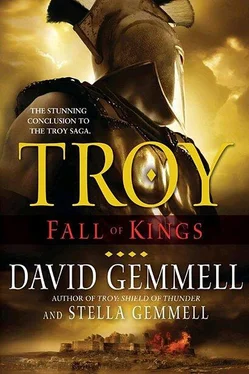Stella Gemmell - Fall of Kings
Здесь есть возможность читать онлайн «Stella Gemmell - Fall of Kings» весь текст электронной книги совершенно бесплатно (целиком полную версию без сокращений). В некоторых случаях можно слушать аудио, скачать через торрент в формате fb2 и присутствует краткое содержание. Год выпуска: 2011, Жанр: Исторические приключения, на английском языке. Описание произведения, (предисловие) а так же отзывы посетителей доступны на портале библиотеки ЛибКат.
- Название:Fall of Kings
- Автор:
- Жанр:
- Год:2011
- ISBN:нет данных
- Рейтинг книги:4 / 5. Голосов: 1
-
Избранное:Добавить в избранное
- Отзывы:
-
Ваша оценка:
- 80
- 1
- 2
- 3
- 4
- 5
Fall of Kings: краткое содержание, описание и аннотация
Предлагаем к чтению аннотацию, описание, краткое содержание или предисловие (зависит от того, что написал сам автор книги «Fall of Kings»). Если вы не нашли необходимую информацию о книге — напишите в комментариях, мы постараемся отыскать её.
Fall of Kings — читать онлайн бесплатно полную книгу (весь текст) целиком
Ниже представлен текст книги, разбитый по страницам. Система сохранения места последней прочитанной страницы, позволяет с удобством читать онлайн бесплатно книгу «Fall of Kings», без необходимости каждый раз заново искать на чём Вы остановились. Поставьте закладку, и сможете в любой момент перейти на страницу, на которой закончили чтение.
Интервал:
Закладка:
“She will, great lord. Yes, indeed.” Atheos licked his thin lips.
“Take her, then, and prepare her.”
The child began to cry once more, but Atheos slapped her soundly across the face.
The distant glow to the east was fading, hidden by a sea mist that had sprung up along the shoreline. The bright moon vanished behind a screen of clouds. The now-naked child was hauled across the sacrificial altar. Agamemnon walked down to watch the ceremony. If it was done expertly, the child would be split open and her heart ripped from her body while she still lived. Then the priest would read her entrails for portents of victory.
The soldiers began to gather, standing silently, waiting for the blood to spurt. While two soldiers held the girl, Atheos took out a long curved knife and began to chant the name of Poseidon. The cry was taken up by the army, thousands of men, their voices rumbling like thunder.
Atheos turned toward the girl, knife raised.
Then came a moment so unexpected and risible that laughter broke out. A clay pot flew over the crowd, cracked against the head of a soldier, then went on to shatter against the priest, drenching him in a foul-smelling liquid. Shocked into immobility, Atheos stood very still, his knife arm still raised. Then he gazed down at his dripping robes.
Agamemnon was furious. He scanned the crowd, seeking the culprit, determined to have him flayed alive. Then a second clay pot shattered in the crowd. Movement in the air caught Agamemnon’s eye, and he saw several small dark objects falling from the sky. They were being hurled from out of the mist beyond the beached ships. One of the missiles struck a cookfire. What followed was horrifying.
The clay ball exploded, spraying flames into the crowd, setting fire to clothing and skin. The massed men panicked and fled toward the high hills. One, his tunic burning, blundered into the priest Atheos. There was a great whoosh, and the priest’s robes ignited in blue and yellow flame.
Atheos dropped his knife and began to beat at the flames with his hands, but then his fingers caught fire, and he screamed and began to run toward the shoreline, seeking the sanctuary of the cold sea. Flames danced over his body, setting fire to his hair. Agamemnon saw the priest stagger and fall. His robes were burned away now, his skin blackened. Yet still the flames clung to him, devouring his flesh.
Another campfire exploded close by. Agamemnon ran to higher ground, clambering over jagged rocks. He turned and gazed back. Only then, as the wind picked up, dispersing the mist, did he see the huge ship out in the bay with its twin banks of oars and a billowing white sail emblazoned with a rearing black horse. Rage and frustration ripped through the Mykene king. Though he had never seen the vessel, he knew its name. All who sailed the Great Green knew the name of that ship. It was the Xanthos, the flagship of Helikaon the Burner.
Down at the shore sailors had scrambled from the decks of their ships and were trying to launch them. It was no easy task, for they were closely packed. One galley almost made it. But as the crew climbed aboard, two missiles struck it. Fire arrows lit the sky, curving up from the Xanthos and then down onto decks slick with nephthar. The galley began to burn. Crewmen, their clothes ablaze, leaped into the sea.
Agamemnon watched in impotent fury as more fireballs rained down on his fleet, fierce flames flowing over dry timbers and seeping down into the holds. The easterly wind fanned the fires, which leaped from ship to ship. Terrified of the inferno, the Mykene sailors fled back toward the hills.
The Xanthos moved slowly across the bay, clay balls of nephthar striking vessel after vessel, fire arrows slicing through the air behind them. A score of Mykene ships and some forty of the barges were on fire now, the flames rising high into the air.
Out on the bay the moon emerged from behind the clouds, shining upon the Death Ship. A warrior in armor of bronze climbed to the prow and stood gazing at the devastation he had caused. Then he raised his arm. Banks of oars dipped into the water, and the Xanthos swung away toward the open sea.
A white figure scurried past Agamemnon. The skinny girl had crawled from the altar and was running away into the hills. No one tried to stop her.
CHAPTER ONE
FAREWELL TO THE QUEEN
Helikaon stood at the stern of the Xanthos, staring back at the burning fleet. He felt no satisfaction as the flames lit the night sky. Removing his helm of bronze, he leaned against the stern rail and turned his gaze toward the east. Fires also were burning in the distant fortress of Dardanos, and the Xanthos headed slowly back toward them.
The breeze was cool upon his face as he stood alone. No one approached him. Even the sailor at the great steering oar kept his gaze firmly fixed to the east. The eighty oars of the great vessel slid rhythmically into the night-dark water, the sound as regular as a heartbeat.
Halysia was dead. The queen of Dardania was dead. His wife was dead.
And his heart was a ruin.
He and Gershom had climbed the steep cliff to where her body lay, little Dex snuggled up beside her, the black stallion waiting close by. Helikaon had run to her, kneeling and lifting her into his arms. There had been a savage wound in her side, and the ground around her had been slick with blood. Her head had flopped back, her golden hair hanging loose.
Dex had cried out, “Papa!” and he had hugged the three-year-old to him. “We must be very quiet,” Dex whispered. “Sun Woman is sleeping.” Gershom lifted the boy into his arms.
“We jumped over it,” Dex said excitedly, pointing to the chasm and the burned bridge. “We ran away from the bad men.”
Helikaon cradled Halysia to him. Her eyes opened then, and she smiled up at him. “I knew… you would come,” she said.
“I am here. Rest. We will get you back to the palace and staunch your wounds.”
Her face was pale. “I am so tired,” she told him, and his vision misted as tears formed.
“I love you,” he whispered.
She sighed then. “Such a… sweet lie,” she said.
She spoke no more, nor ever would, and he knelt there, holding her close.
Across the chasm the sounds of battle grew closer. He did not look up. Hektor and the Trojan Horse had driven the Mykene along the defile toward Parnio’s Folly, and there the enemy had made its last stand.
But Helikaon did not care. He stroked his fingers through Halysia’s golden hair and looked down into her dead eyes. Other men came climbing the cliff. They stood around him silently. At last he closed Halysia’s eyes.
He gave orders for her body to be carried back to the fortress, then slowly made his way to meet Hektor.
“There is still some fighting to the northeast,” Hektor told him. “The enemy general tried to battle his way to the coast. We have them penned.”
Helikaon nodded.
“We took a few prisoners,” Hektor said. “One told us Agamemnon and a war fleet are on Imbros. I don’t think we can hold here if they come. The Seagate is ruined, and my men are weary.”
“I will deal with them,” Helikaon said coldly. “You finish the resistance here.”
Calling his men, he had returned to the Xanthos and set sail into the night. He had expected to face battle with a screen of war galleys protecting the main fleet, but the Mykene, with the arrogance of conquerors, believing themselves safe from attack, had beached their entire fleet on Imbros for the night.
It was a mistake Agamemnon would rue.
The Xanthos sailed serenely on, the burning fleet lighting the sky behind the great ship, the screams of the dying like the cries of distant gulls. The weight of guilt settled on Helikaon as he stood alone, and he remembered his last conversation with Halysia the previous spring. He had been preparing to raid along the Mykene coastline, and she had walked with him down to the beach.
Читать дальшеИнтервал:
Закладка:
Похожие книги на «Fall of Kings»
Представляем Вашему вниманию похожие книги на «Fall of Kings» списком для выбора. Мы отобрали схожую по названию и смыслу литературу в надежде предоставить читателям больше вариантов отыскать новые, интересные, ещё непрочитанные произведения.
Обсуждение, отзывы о книге «Fall of Kings» и просто собственные мнения читателей. Оставьте ваши комментарии, напишите, что Вы думаете о произведении, его смысле или главных героях. Укажите что конкретно понравилось, а что нет, и почему Вы так считаете.












